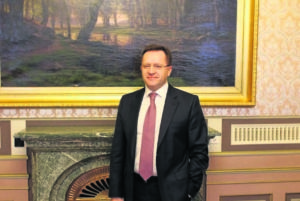News
Russian ambassador weighs in on Danish defence spending debate
This article is more than 7 years old.
Recent political agreement reached by Parliament to increase military budget predicated on non-existent threat, claims Mikhail Vanin

Mikhail Vanin laments Denmark’s anti-Russian moves (photo: Christian Wenande)
The defence minister, Claus Hjort Frederiksen, and the government’s support parties have argued that a more aggressive Russia demands greater military expenditure in response.
To that end, a new agreement has resulted in a package that will see 12.8 billion kroner spent on defence up to and including 2023, which includes a new fully-equipped brigade to be used with NATO forces, plus upgrading anti-aircraft capabilities on Danish ships in the Baltic.
The root of all evil?
However, Russia’s ambassador to Denmark, Mikhail Valentinovich Vanin, argues that this is totally misguided, reports Berlingske Tidende.
“Russia is once again [seen as] the root of all evil in the world, Europe and the Baltic. But it is quite obvious that Russia has never planned – or plans – to commit any aggressive act towards European capitals and NATO members,” he said.
READ ALSO: Government’s new defence initiative shifts gaze eastwards
The ambassador sees the allegations as a political weapon used by politicians to make the expenditure more palatable to voters.
“Surrealism has become the order of the day when political views are presented in the West these days, and this kind of doomsday scenario is being promoted by the comments of Danish politicians on the new defence agreement,” added Vanin.
Just safeguarding our national security
He urges Danish politicians and experts to “use some of their time to read the Russian Federation’s military doctrine”, as then they would understand that Russia has no intention of attacking the Baltic countries or NATO.
“The Russian Federation’s military doctrine is designed to safeguard our national security in the event of aggression from a foreign power,” he said.
“Europeans regularly die at the hands of terrorists on the streets of European cities. Not one single Dane has perished at the hands of the ‘evil Russians’ and our countries have never been at war, so who is the real threat to Denmark?”










































